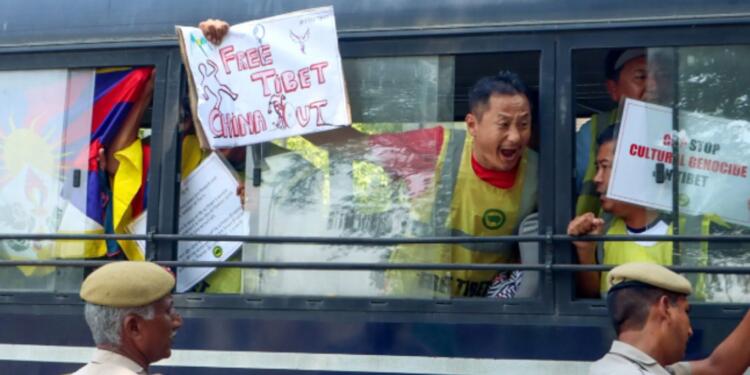China, a country that everyone sees with suspicion, marked its National Day on 1st October as on Tuesday, the Chinese Communist Party completed 75 years. While the occasion meant a cause for celebration for China, it has been a rallying call for Tibetans to rise against the illegal occupation of their territories.
#WATCH | Delhi: Tibetans in Delhi hold a protest outside the Chinese embassy as China celebrates its national day today.
The protestors were detained by police. pic.twitter.com/m3FFjuMCgh
— ANI (@ANI) October 1, 2024
In India, a significant number of Tibetans gathered in front of the Chinese Embassy in New Delhi. During the protest, they raised slogans against the Chinese regime before they were detained by the Delhi Police. But the question that lingers is what necessitated Tibetans to protest outside the Chinese Embassy, especially on a day when the communist nation was marking its National Day.
Brief ordeal of Tibetans
It is pertinent to note that what China considers a National Day sounds more like a curse to Tibetans. They were forced to leave their homes and become refugees across the world. On this unfortunate day in 1949, the communist forces took over mainland China and tragically changed the fate of the Himalayan nation. Tibetans, who had preserved and cherished their rich and ancient Buddhist culture, were left at the mercy of authoritarian China. For decades, their plights are for everyone to see, China has trampled their culture, purged their language, and forced them to change their occupation and native land. This all has been done as part of a complete Sinasisation of Tibet.
Apart from occupying Tibet, China has been aiming to establish its sovereign rule in the occupied territories. For this, it has been persecuting Tibetans, meddling in their affairs, and altering their culture.
The Tibetan National Uprising against the sinister Chinese actions was brutally crushed by the People’s Liberation Army (PLA) in March 1959.
The Dalai Lama, who fled China after the uprising, is a living example of what Tibetans had to go through under Chinese rule.
After the Dalai Lama fled, China continued with its policy and abducted the next Panchen Lama, replacing him with a Chinese pawn.
To this day, the persecution continues but remains unknown as the PRC controls all media.
Tibetan voices echo across the world
The only voices that resonate are the free voices of Tibetans living across the world. Tibetans confronted China in France with Free Tibet banners during Xi Jinping’s visit in May this year.
On the 65th Tibetan National Uprising Day, Tibetans protested in Vienna in March this year.
Tibetans have received tremendous support in countries like India, which provide them with a platform to express their sentiments. Not only this, but India also expresses solidarity with their cause and their right to be the rightful owners of their land. India recently named a peak in Arunachal Pradesh after the 6th Dalai Lama, a move that rattled China. Beijing issued a statement calling the move illegal, yet another example of Chinese expansionism that meddles in the affairs of neighbouring countries.
To deal with Chinese aggression, countries around the world have taken proactive measures. Earlier in June, US Congress Speaker Nancy Pelosi made her third official visit to Dharamshala and met with the Dalai Lama. Her visit was instrumental as she was heading a Congressional delegation.
Moreover, the US has also passed the Resolve Tibet Act 2024, aiming to pressurize China into negotiating a dispute with the Dalai Lama. This was the third notable act in the US after the Tibetan Policy Act (2002) and the Tibetan Policy & Support Act (2020).
However, even after such efforts, the dream of Tibetans to return home with sovereign rights over their land and freedom to live according to their traditions is far from reality, as Chinese aggression is succeeding in taking the region to an extent from which return would be next to impossible.




















